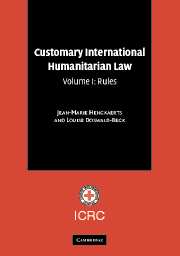Book contents
- Frontmatter
- Contents
- Foreword by ICRC President Jakob Kellenberger
- Foreword by Judge Abdul G. Koroma
- Foreword by Yves Sandoz
- Acknowledgements
- Introduction
- List of abbreviations
- Part I The Principle of Distinction
- Chapter 1 Distinction between Civilians and Combatants (Rules 1–6)
- Chapter 2 Distinction between Civilian Objects and Military Objectives (Rules 7–10)
- Chapter 3 Indiscriminate Attacks (Rules 11–13)
- Chapter 4 Proportionality in Attack (Rule 14)
- Chapter 5 Precautions in Attack (Rules 15–21)
- Chapter 6 Precautions against the Effects of Attacks (Rules 22–24)
- Part II Specifically Protected Persons and Objects
- Part III Specific Methods of Warfare
- Part IV Weapons
- Part V Treatment of Civilians and Persons Hors De Combat
- Part VI Implementation
Chapter 3 - Indiscriminate Attacks (Rules 11–13)
Published online by Cambridge University Press: 05 June 2012
- Frontmatter
- Contents
- Foreword by ICRC President Jakob Kellenberger
- Foreword by Judge Abdul G. Koroma
- Foreword by Yves Sandoz
- Acknowledgements
- Introduction
- List of abbreviations
- Part I The Principle of Distinction
- Chapter 1 Distinction between Civilians and Combatants (Rules 1–6)
- Chapter 2 Distinction between Civilian Objects and Military Objectives (Rules 7–10)
- Chapter 3 Indiscriminate Attacks (Rules 11–13)
- Chapter 4 Proportionality in Attack (Rule 14)
- Chapter 5 Precautions in Attack (Rules 15–21)
- Chapter 6 Precautions against the Effects of Attacks (Rules 22–24)
- Part II Specifically Protected Persons and Objects
- Part III Specific Methods of Warfare
- Part IV Weapons
- Part V Treatment of Civilians and Persons Hors De Combat
- Part VI Implementation
Summary
Rule 11. Indiscriminate attacks are prohibited.
Practice
Volume II, Chapter 3, Section A.
Summary
State practice establishes this rule as a norm of customary international law applicable in both international and non-international armed conflicts.
International armed conflicts
The prohibition of indiscriminate attacks is set forth in Article 51(4) of Additional Protocol I. At the Diplomatic Conference leading to the adoption of the Additional Protocols, France voted against Article 51 because it deemed that paragraph 4 by its “very complexity would seriously hamper the conduct of defensive military operations against an invader and prejudice the inherent right of legitimate defence recognized in Article 51 of the Charter of the United Nations”. Upon ratification of Additional Protocol I, however, France did not enter a reservation with respect to the prohibition of indiscriminate attacks. At the Diplomatic Conference leading to the adoption of the Additional Protocols, Mexico stated that Article 51 was so essential that it “cannot be the subject of any reservations whatsoever since these would be inconsistent with the aim and purpose of Protocol I and undermine its basis”. The prohibition of indiscriminate attacks is also contained in Protocol II and Amended Protocol II to the Convention on Certain Conventional Weapons.
A large number of military manuals specify that indiscriminate attacks are prohibited. Numerous States have adopted legislation making it an offence to carry out such attacks. The prohibition is supported by official statements and reported practice.
- Type
- Chapter
- Information
- Customary International Humanitarian Law , pp. 37 - 45Publisher: Cambridge University PressPrint publication year: 2005
- 2
- Cited by

